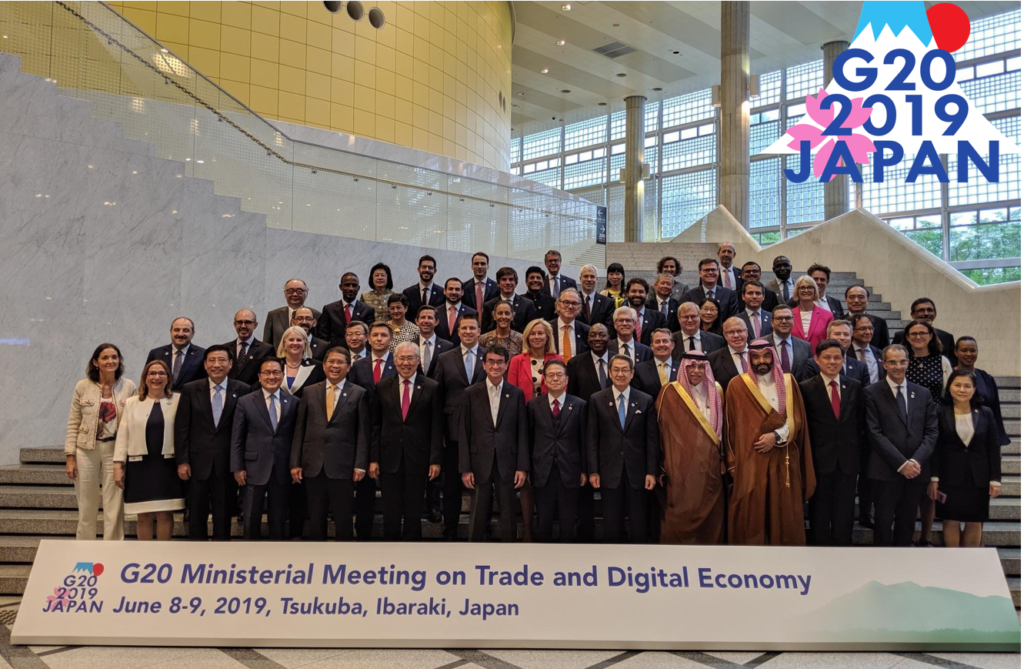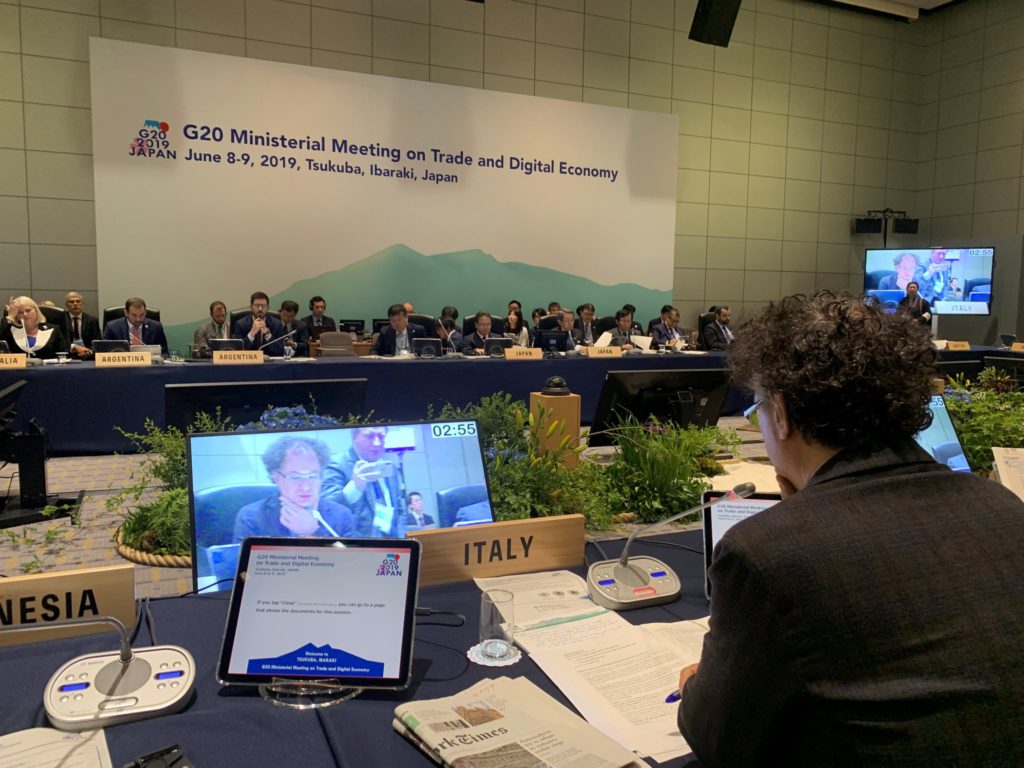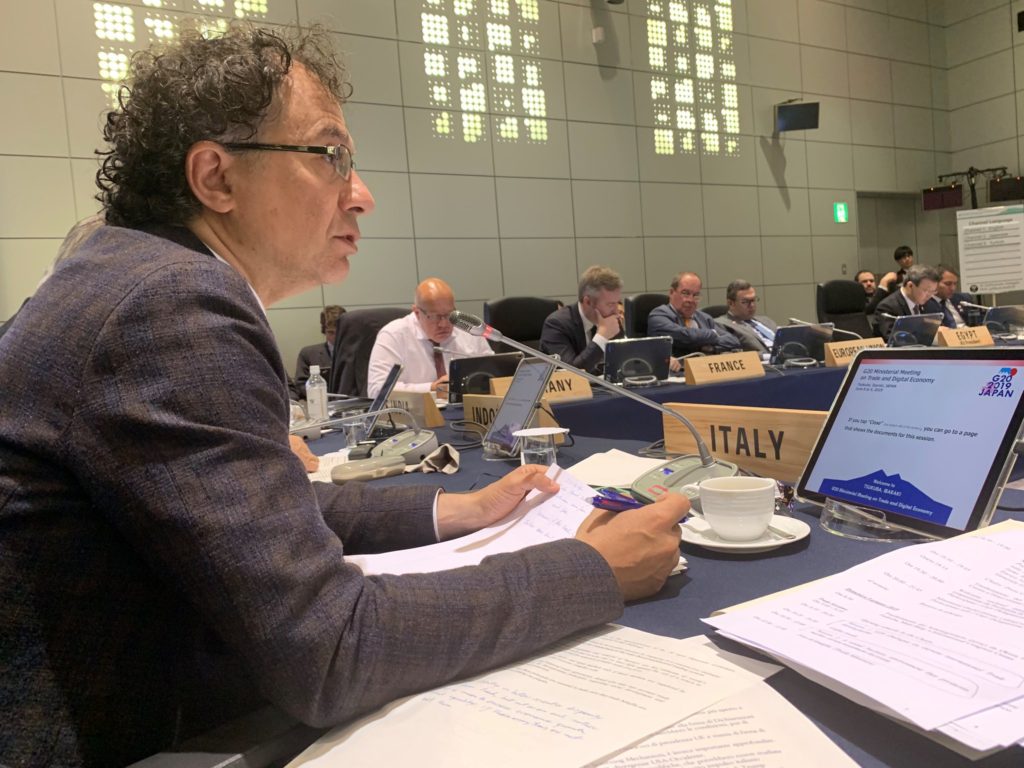
The 2019 G20 ministerial meeting on trade and the digital economy held in Tsukuba in Japan ended at the same time as the G20-Finance session attended by Minister Tria. I had the honour of representing Italy both for the Digital and Trade sessions.
• The Digital session focused on the theme “Data Free Flow with Trust “, a sort of compromise or, if you want, a conflict between the attempt to favour a useful exchange of information between companies and countries and, on the other hand, to preserve user’s privacy. Several countries expressed different views on which priority to choose. I put on my hat as a former electronic engineer and I pointed out how it can be difficult to find the right balance between these two needs and, perhaps more importantly, how the speed of technological innovations is much faster than a human being can get used to; this gap creates tension, resistance and fear, which is a topic more for sociologists. On a different dimension, various emerging countries have shown strong resistance to accelerating e-commerce and data transmission within the WTO rules, for fear of not being able to compete on a par basis with big countries. During the meeting, I have also emphasized the possible dualism between the advantages and disadvantages of the development of digitalization: on the one hand, there are undeniable positive effects linked to the lowering of costs for software and hardware and the consequent easier access to technology for most people, which should in theory lead to a convergence between rich and poor and a reduction of social disparities; on the other hand, the sometimes excessive speed of the evolution of technology and the concentration of know-how in the hands of the few could, instead, have the opposite effect, that is, leading to an increase of the gap, a kind of winner-takes-it-all scenario, which in part already exists in some digital sub-sectors.

• The Trade session was affected by the deteriorating international climate, as indicated by the numerous commercial wars, whether they are real or threatened, which are increasingly dominating the international trade debate. The topics dealt with included the tensions between the US-EU-China, the reforms of the WTO and, as in the Digital Session, the redistributive effects of globalization and international trade.
Despite the non-ideal climate, we made efforts in two areas: on the one hand, we expressed the need for particular protection for micro, small and medium-sized enterprises (MSME), which makes up over 99% of the Italian entrepreneurial fabric, and which are those most at the mercy of uncontrolled globalization, precisely because they are less flexible and less adaptable to sudden changes. This tendency to provide protection to the weakest is becoming increasingly present in the international debate, given that the laws, which I define as ‘Darwinian’, of the globalization process create ever greater disparities between winners and losers, and therefore need compensation mechanisms which, for example, at the EU level are not effective. On the other hand, we continued promoting international trade, which accounts for a third of our Italian economy, and which grew by 6.7% in the first few months of 2019 towards non-EU countries, which have been the main focus of our promotion initiatives and of our institutional missions (USA, China, India, Korea, Japan, Georgia, Azerbaijan, Emirates), which are particularly useful in those countries where the local government has strong influence and therefore where the G2G relationship has a direct “cascade” effect on business relationships.
Another very divisive chapter on the Tsukuba table concerned the reform of the World Trade Organization / WTO, which sees the US on a very rigid position, in favour of a literal interpretation of the WTO charter in defining the actual competences of the Dispute Settlement Body and Appellate Body, in contrast to more pragmatic and flexible positions of the European Union, aimed at guaranteeing the functionality of an institution which, as is known, is on the verge of a paralysis due to the expiry of its members. We, representing Italy’s views highlighted the need to introduce regulatory changes to the functioning of the WTO and the anti-dumping procedures, which would also take into account the nationality of the ultimate controlling entity, in order to avoid cross border dumping.
Conclusions
Despite the very complex context, we managed to reach a final consensus ministerial declaration, not without compromise in language and content, during negotiations that lasted until 6 am the following morning: real negotiating marathons in which we obtained explicit references against industrial subsidies and highlighted the need for protection of the weakest: we fought from the beginning of this heated G20 meeting to include references to a more equitable redistribution of the benefits of trade and investment, a battle I had already undertaken at G20 in Mar del Plata Argentina last year. Finally, it was certainly positive that we included references to multilateral negotiations on subsidies to fishing and on E-commerce.
Although it is objectively difficult to find agreement between 20 economies different from each other, and the final communiqué represents the lowest common denominator of what many countries – with visions often completely different from each other – are willing to accept, it was a good step ahead along a process that necessarily takes a long time. Having said that, we will continue to commit ourselves to making Italy increasingly a main player in these international forums and enhance its influence. In the meantime, Tsukuba was a good starting point in view of the Osaka G20 which our President Conte will attend at the end of the month and, in the long term, in preparation for the G20 Presidency that Italy will host in 2021.

